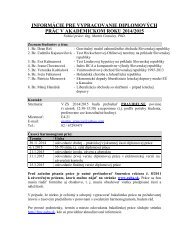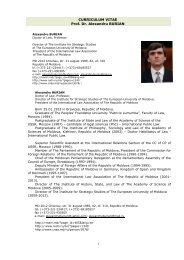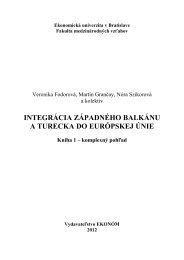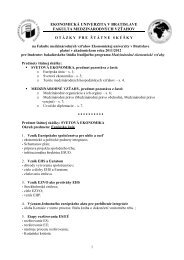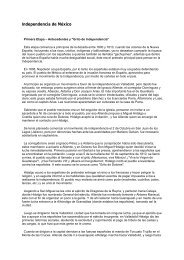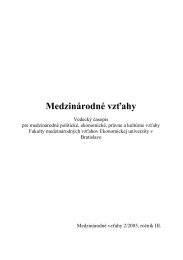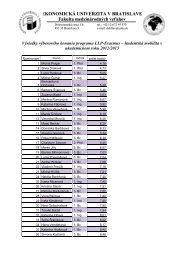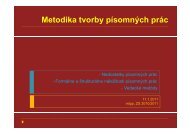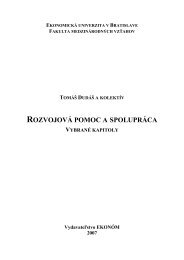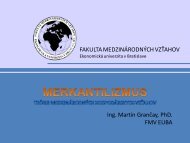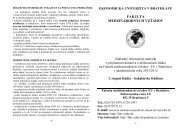4 - Fakulta medzinárodných vzťahov - Ekonomická univerzita v ...
4 - Fakulta medzinárodných vzťahov - Ekonomická univerzita v ...
4 - Fakulta medzinárodných vzťahov - Ekonomická univerzita v ...
Create successful ePaper yourself
Turn your PDF publications into a flip-book with our unique Google optimized e-Paper software.
On the partners’ side we see that some of them are eastwards oriented and perceivetheir future in close cooperation with Russia rather than in integration with the European Union.Secondly, political situation of most of them is becoming very distant from European standardsof democracy and state of law, especially in Belarus, Azerbaijan and Armenia.However, the greatest obstacle for the Eastern Partnership were the recentrevolutionary developments in North Africa and Middle East which in many cases resulted inabolition of authoritarian regimes. What in this regard is more important is the fact that themain attention of European politicians and societies has been directed to the EU SouthernNeighborhood and the area behind the Eastern border of the EU is not in the center of theirinterest.Does it therefore mean that the EU Eastern Partnership advocated by Poland andSweden has lost its rationale and sense? That the key priority of the Polish Presidency in theEU is doomed to fail? It should be noted that the situation is very difficult but not hopeless.4 How to defend Eastern Partnership?Firstly, Poland’s Western partners in the EU whose attention is focused upon theSouthern neighborhood have to be persuaded that policy of Eastern Partnership is in the interestof the whole Europe, not only Poland. The developments and revolutions in North Africa andMiddle East clearly show what might be the consequences of toleration and support ofauthoritarian regimes by the European Union. It is possible that such riots and demonstrationsmight happen in Eastern Europe quite soon.Secondly, Poland is an advocate of symmetrical treatment of both Southern andEastern neighborhood of the EU. In other words, the two elements of the ENP should berecognized as equally important, mutually enriching and synergetic. Moreover, the Union'sexperience of promoting democratic reforms in the countries of our Eastern neighborhoodshould serve as a template for the South. Also, the experience of democratic transition andknow-how acquired by the Central and Eastern European states ”constitutes a highly valuablepolitical capital to be used especially in those domains which pose challenges to the reformprocesses in both the Eastern and the Southern neighborhood” 21 . Building around Europe a ringof democratic and prosperous countries is a vital security and economic interest of the EU. Themember states of the EU should care to the same extent about every neighbor, whatever itsgeographical position is. Therefore, both East and South require symmetric attention andfinancing 22 .Poland is in favor of a revised and reformed ENP which must focus more on a tailormadeand flexible approach towards each of the EU neighbor’s specific political, social andeconomic reform priorities. Equally important is the postulate that the distribution of resourcesmust be tied with the conditional principle of 'more for more' which should thereby establish apractice of mutual engagement between the affected parties.Progress in development of democracy, human rights, fight against corruption, and therule of law would be a precondition for the EU support, rewarding those countries which followthe agreed reform plans. Also, the benchmarks must be adjusted to the specific situation of theSouthern and Eastern Neighborhood countries, which depart from very different positions.Moreover, the new value-based neighborhood policy has to have considerably morerespect for ordinary citizens of the ENP countries and must be less tolerant or permissive ofauthoritarian and façade-democratic regimes. Societies rather than governments should be inthe center of its attention. The new program is to change the type of policy from a bureaucratic21 Saryusz-Wolski, J. (2011): Non-paper on the European Neighbourhood Policy's Easterndimension, “Europe’s World”, 30.05., p. 2.22 Ibidem.MEDZINÁRODNÉ VZŤAHY, 2012, 4 ○ 125



